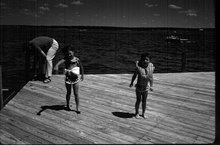 for b.
for b.Editing
The Penetrable Air is not a painless affair. The oblique approach of speaking about the past in mythological terms does not deliver us from evil, nor displace the pain. I have severed some part of myself that localized the exquisite memories of that house and its horrors (I say “horrors” although on the spectrum they are subtle, subtle horrors) and yet continually try to find that place that I buried the severed thing, like the dream of the cat stowed away in the box, or the very real rubber alligator purloined form the TG&Y many, many years ago. Time has so contorted the events in my mind that I am no longer certain that I lived there in that old hotel. Today was my “father’s” birthday--ironically he has assisted graciously with the minutiae that I could not call forth on my own--the seasons of planting corn and winter wheat--the lineage of
the hotel. And yet he is portrayed in a less than flattering light, as are my mother and grandmother, who I hope never will read what I’ve written. That through many iterations the novel was titled “Medea” gives some indication.
Interestingly, I realized that a strange counter-phenomenon was at work in both
Redemption Shoes and
Penetrable Air (God, I sound like Ayn Rand writing her own introduction to
The Fountainhead!)--in
Air, a work of fiction, I had named each female character and offered up lengthy backstory, whereas in
Shoes, non-fiction, only the paternal ancestors were explored. It begged the question of whether the female stories could be conveyed in any but mythological terms (consider
Housekeeping and
Gilead, for instance). It also called to mind Susan Brind-Morrow and her mention of the desire to one day catalog the ephemeral grief songs of the women of the Red Sea, the unrecorded liturgies of sorrow--
the grief songs.
Right now my life feels like a grief song. Inconsonant and out of tune with some barely audible scale--if you know the Crowded House song,
Fall at Your Feet, Google the tabs and play the chords. These chords seem nowhere in the range of the melody--either brilliance or madness, or something is terribly out of whack. I rest my case. There are a lot of covers of this song on YouTube, but
this one brought tears to my eyes--it's so fucking honest. (She's still playing different chords--just try it yourself...)











